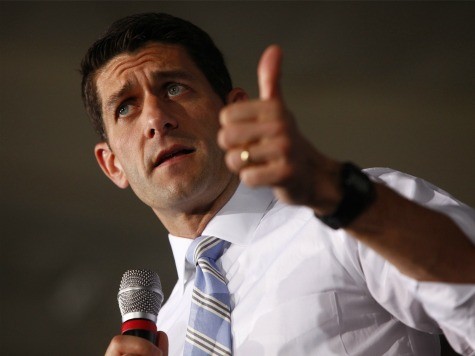On Monday, Rep. Paul Ryan (R-WI) argued that the budget deal he cut with Sen. Patty Murray (D-WA) was a political win for Republicans because it avoided the possibility of another government shutdown, thereby keeping focus supposedly on Obamacare before the 2014 election cycle. “On our side of the aisle, we like the fact for the economy, no shutdowns,” Ryan told NBC’s Meet the Press. “We also don’t want to have shutdown drama so we can focus on replacing Obamacare, so we can focus on showing better ideas and what this is coming in.”
This has become the common wisdom surrounding the government shutdown in October: the notion that Republicans somehow distracted from Obamacare failures by refusing to fund Obamacare, thereby leading to a shutdown that ended in disastrous political polling for the GOP. To avoid another such catastrophic impasse, the logic goes, Republicans should sign onto a bill that raises spending in the short run but supposedly reduces it in the long run.
The big problem with this logic is that it is a misreading of the politics of the shutdown itself. Most observers recognized going in that the shutdown was not going to end with the repeal of Obamacare – not with President Obama in the White House and a solid Democratic majority in the Senate, plus enough Republicans willing to end the shutdown without any real concessions.
The real upshot of the shutdown was that the American public recognized that Republicans would stand firm against the implementation of Obamacare – and simultaneously, Americans were forced to pay attention to the disastrous rollout of Obamacare, since the highly-publicized shutdown focused on Obamacare itself. The results: Senator Ted Cruz (R-TX), the ringleader of the shutdown, has vaunted into prime political position, with polls of Americans ranking him as the third most influential figure in the world, behind the Pope and President Obama. Meanwhile, President Obama’s polls have been steadily sinking ever since the Obamacare rollout – he hit a record low in job approval among Americans last week, with just 38 percent approving, versus 58 percent disapproving.
In fact, even Ryan recognizes the fact that the shutdown was a net positive for Republicans – that’s why he continues to insist, despite his budget deal, that he will ask for concessions when America hits the debt ceiling again in February. If he truly believed that fighting over budget matters distracts from the true issue of Obamacare, he wouldn’t threaten movement on the debt ceiling – he’d look for a way to avoid a debt ceiling fight.
Some Republicans may be looking to buy a little breathing space. But strategically speaking, they’d be wise to continue to stand up against Obamacare in every available way, especially given the fact that we have not yet hit the end of 2013. Establishment politicians like Ryan may think that Tea Partiers like Cruz need a little strategic refresher – but Ryan would do well to remember that it’s Cruz, not a certain former vice presidential candidate, who is leading the anti-Obamacare fight in the minds of Americans.
Ben Shapiro is Editor-At-Large of Breitbart News and author of the New York Times bestseller “Bullies: How the Left’s Culture of Fear and Intimidation Silences America” (Threshold Editions, January 8, 2013). He is also Editor-in-Chief of TruthRevolt.org. Follow Ben Shapiro on Twitter @benshapiro.

COMMENTS
Please let us know if you're having issues with commenting.